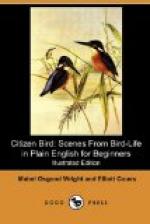“Not the kind of a pistol that you mean, Dodo, but the only kind that you youngsters need to bring down birds so that you can see them. It is a double-barrelled gun, but you must use your eyes for bullets, instead of leaden balls. See!”—and he took a fine pair of field-glasses from the case, moved the screw a little, and held them before Dodo’s eyes—“what do you see down there in the grass?”
“Why, it’s a Robin, but how big it looks! Every feather shows by itself, and it has white rings round its eyes like spectacles. I never saw them before, I’m sure.”
Then, as the Doctor handed the glasses to Nat, Dodo looked in her lap, expecting to find the bird there instead of a hundred feet away.
“This is jolly!” cried Nat, taking a peep and passing the glasses to Rap, who put them to his eyes, gave a little “ah,” and looked through them until the Doctor said, “That will do now. Olive shall keep the glasses, and whenever you children want them she will give them to you; but you must be careful never to scratch them or rub your fingers over the lenses at either end. With this magnifying instrument you will be able to see the shape of beaks and wings, and many color markings you would never notice otherwise. But what did I promise to tell you of to-day, children?”
“Citizen Bird, you said,” replied Nat, “though I don’t think I quite know what you mean.”
“What does citizen mean?” asked the Doctor, smiling.
“I think it is a person who lives in a city, but birds aren’t people and they don’t live much in the city.”
“You are right in one sense, my boy, but the word citizen has also a far wider meaning. Do you know what it is, Olive?” But Olive was not sure, and the Doctor asked her to go to his study and look for the word in the big dictionary.
In a few minutes she returned with a slip of paper from which her father read: “Citizen—a member of a nation, especially of a republic; one who owes allegiance to a government and is entitled to protection from it.”
“Now, if you listen carefully I think I can prove to you that every bird you can find is such a citizen of this country, and show you why we should protect him.
“I told you the other day how the body of a bird was planned and built to fill a place no other animal could take. Thus by his habits and character every bird fills a place as a citizen of our Republic, keeping the laws and doing work for the land that House People, with all their wisdom, cannot do. Every such fellow-animal of ours, besides having eyes to see with, and a brain which, if it does not tell him as many things as our brains tell us, yet teaches him all that he need know to follow the laws that Heart of Nature has set for him, has the same feelings and affections as ourselves. Parent birds love each other and their little ones, and often lose their lives in trying to protect them. They build their homes with as much care and skill as House People use in making theirs. Then they work hard, very hard indeed, to collect food to feed their children, for bird children are, oh, so hungry! They grow very quickly, and must eat constantly from morning until night.




